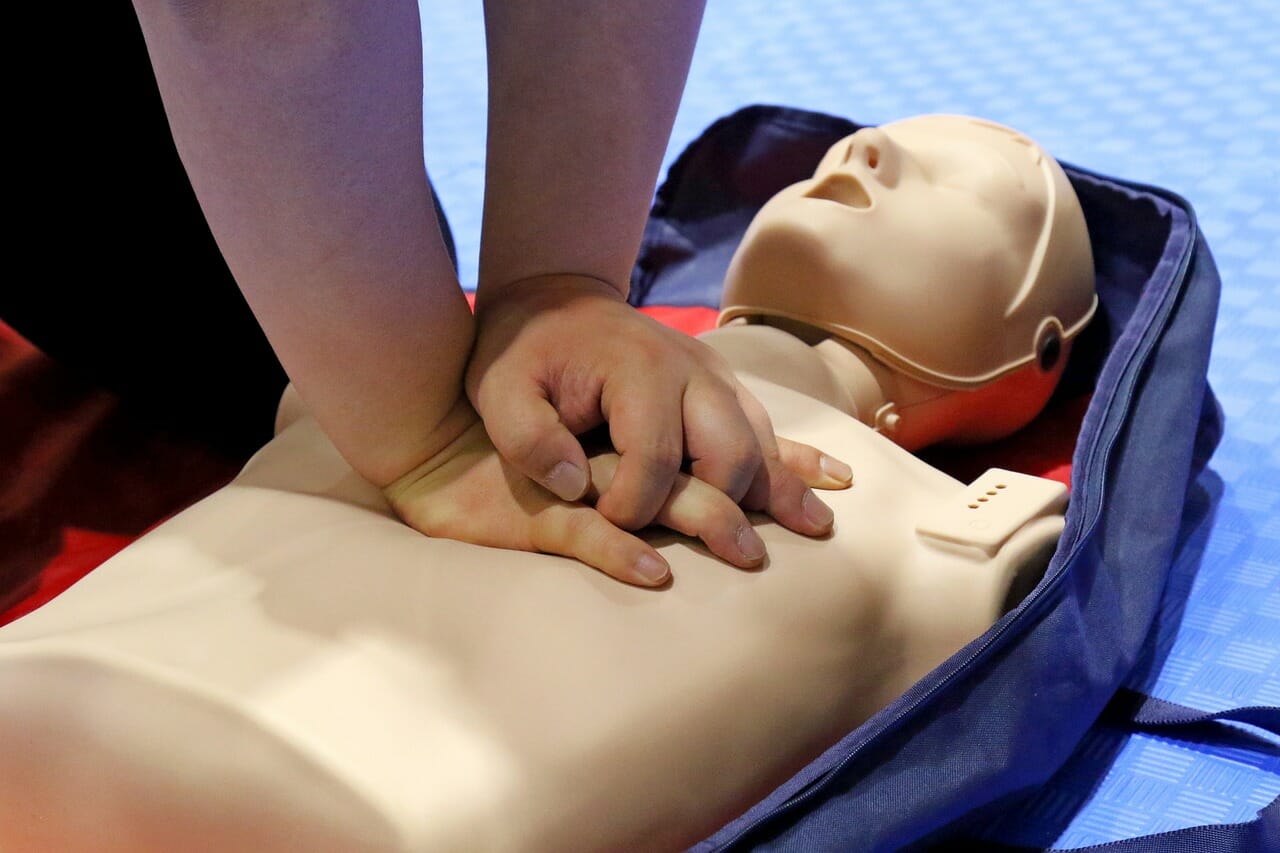First aid is a vital skill to have, whether you’re at home or out and about. Knowing the basics of first aid can help to save someone’s life in an emergency situation. In this article we’ll be looking into the different types of first aid courses available for those living in the UK.
From short one-day classes that cover basic skills to more comprehensive certification programs, there are plenty of options when it comes to learning lifesaving techniques. Whether you are a complete beginner or already have some experience with basic medical care, we will go through all the courses available so you can find the right one for your needs.
Basic First Aid Course
Taking a first aid course is like taking a breath of fresh air for your safety; knowing how to respond to medical emergencies can be the difference between life and death. So, let’s explore what a basic first aid course looks like in the UK.
A basic first aid training usually covers essential topics like cardiopulmonary resuscitation (CPR), primary survey, dealing with wounds and fractures, as well as providing emergency help for choking victims. The duration of these courses may vary depending on where you take them – it could range from half a day or even up to two days!
These courses are designed to give learners an understanding of the basics so that they can properly assess any situation and act accordingly. All participants will receive official certification at the end of their training which shows that they have achieved a certain level of competence in administering first-aid. Plus, this certificate also demonstrates commitment towards health and safety regulations – making it especially important if individuals work in an industry that requires such qualifications.
So, when looking into different types of first aid courses available in the UK, make sure to consider enrolling in one that provides comprehensive knowledge and practical guidance on how to deal with possible medical emergencies. Doing so will not only equip you with all the necessary skills but provide peace of mind should anything unexpected happen down the line.
Emergency First Aid At Work Course
It’s ironic that the very thing we need to stay safe in an emergency is what most of us overlook – a proper first aid course. Yet, it’s precisely this type of training that can be lifesaving when unexpected circumstances arise. That’s where the ‘Emergency First Aid at Work’ course comes in!
This essential course provides comprehensive knowledge and skills for those who want to respond swiftly and confidently to medical emergencies. It covers basic life-saving techniques such as cardiopulmonary resuscitation (CPR) and how to use an automated external defibrillator (AED). Participants also learn about accident reporting procedures, assessing risks and responding effectively in a variety of emergency scenarios.
The course typically consists of 6 hours of instruction delivered by qualified trainers who will assess participants on their abilities before awarding certification. This UK accredited program enables individuals to provide effective emergency care both at home or work – giving them peace of mind in any situation they may encounter.
Pediatric First Aid Course
Paediatric first aid courses are an important part of a child’s safety in the UK. This type of course is designed to give parents, guardians and carers the knowledge they need to respond quickly and effectively in emergency situations. It focuses on how to provide basic life support for infants and children, recognising common signs and symptoms of illness, knowing what intervention is required and when to seek further medical assistance.
The paediatric first aid course typically covers topics such as primary assessment, CPR, choking management, dealing with shock, minor injuries and burns. Participants also learn about common childhood illnesses including meningitis, diabetes, asthma and epilepsy. They will be taught how to safely administer medication if necessary. Furthermore, learners gain an understanding of the legal framework around safeguarding vulnerable people from potential harm or abuse.
It is essential that those looking after young children have access to this kind of training so that they can confidently identify any risks or dangers present in their environment and take action accordingly. Through attending a paediatric first aid course participants not only become more aware but also gain valuable skills which could potentially save lives.
Outdoor Emergency First Aid Course
When heading outdoors, it’s important to make sure you are prepared for any emergency that may occur. One way of doing so is by taking an outdoor emergency first aid course. For example, a group of hikers recently took such a course and learned how to administer life-saving techniques during their excursion in the wilderness.
Outdoor emergency first aid courses typically cover topics like wound treatment and infection prevention, as well as CPR and basic medical help. Participants learn how to identify and assess potential dangers while on an expedition, plus they gain knowledge on what types of equipment should be carried with them at all times. Additionally, trainees get access to simulations where they can practice responding to different scenarios that could happen out in nature.
This type of training equips individuals with the tools needed to face hazardous conditions confidently and calmly. Through hands-on practice sessions, participants become familiarized with various safety protocols and best practices when dealing with emergencies outside the comfort of civilization. With this kind of education, adventurers can take necessary precautions against unexpected disasters while enjoying the great outdoors!
Workplace First Aid Course
Are you looking to take a first aid course in the UK? Needing one for your workplace? Look no further than a workplace first aid course. It is an ideal choice to meet health and safety obligations while making sure that everyone stays safe and secure in their environment.
This specialized course covers all of the essential elements of basic life support, as well as how to recognize any potential hazards in the work atmosphere. You’ll learn how to administer emergency medical treatment when needed, and be equipped with the knowledge on how best to respond if someone has been injured or becomes ill within your place of work.
The practical components of this type of course allow you to practice what you’ve learned in real-life scenarios, so that you’re able to confidently respond should an emergency arise – giving peace of mind that your staff are prepared for anything they may face at work.
Automated External Defibrillator (Aed) Course
An Automated External Defibrillator (AED) course is becoming increasingly popular in the UK. In fact, according to recent statistics, over 80% of people are now trained in AEDs every year. This type of first aid training can be invaluable for workplace and public settings alike, as it equips individuals with the knowledge and skills necessary to save lives when needed.
In an AED course, participants learn about how defibrillation works and what circumstances require its use. They also get hands-on experience in operating a variety of different types of AEDs, allowing them to become comfortable using the device before they need to actually do so in an emergency situation. The course will also teach important safety precautions like ensuring there are no bystanders nearby during operation and that proper protective gear is always worn while handling an AED.
As well as providing theoretical education on how best to operate an AED, many courses provide simulations or even real-life practice scenarios where trainees can put their newfound knowledge into action under controlled conditions. By doing this, they gain confidence in their own abilities while learning more valuable tips from experienced professionals along the way. With all these benefits combined, it’s easy to see why taking an AED course is a great idea for those looking to expand their first aid qualifications in the UK.
Mental Health First Aid Course
Have you ever considered how important it is to provide mental health first aid? This type of course gives people the skills and confidence they need to support someone who may be experiencing a mental health issue or crisis. But what exactly does this training involve?
Mental health first aid courses are designed to teach participants about common signs and symptoms of mental health issues, including depression, anxiety, psychosis and substance abuse disorders. It also provides practical advice on how best to approach, assess and assist those with these problems. Participants will learn how to listen without judgment or bias, as well as when and where to refer individuals for professional help. They’ll gain an understanding of national policies such as Mental Health First Aid England (MHFA), which aims to reduce stigma around mental illness and improve access to appropriate care.
In addition, trainees will develop their own problem-solving skills during these sessions. The aim is for them to identify potential solutions that can help alleviate distress in individuals struggling with mental health difficulties. With knowledge gained from the course, participants should feel better equipped to take action if necessary and have more confidence in providing a supportive environment for those affected by mental health problems.
Mental health first aid courses offer invaluable information that could save lives – not just through prevention but also in terms of supporting those already facing a difficult situation due to their mental wellbeing. Knowing your actions can make all the difference means everyone has the power to be part of positive change within our society today.
Sports First Aid Course
Athletes often need a special kind of first aid – one that is tailored to the needs and requirements of sports. Sports first aid courses offer this, providing players with an essential safety net as they take part in their favourite activities. It’s like a helping hand for those times when you may find yourself out on the court or track without anyone else around; these courses are there to ensure your well-being is taken care of.
Just like having a life jacket ready when you jump into the deep end, taking a sports first aid course gives athletes assurance that help will be available if anything should happen while playing. The expertise and knowledge gained from such courses can also provide participants with confidence to tackle any injuries or medical emergencies that arise during competition. Whether it’s dealing with cuts, bruises, sprains, strains, cramps or more serious situations such as asthma attacks and seizures – knowledge acquired through attending a sports first aid course ensures athletes have all the necessary tools at their disposal when faced with them.
Participants gain invaluable skills by completing one of these courses – skills which not only benefit themselves but other members within the sporting community too. From knowing how to properly administer CPR and use AEDs (Automated External Defibrillators) to understanding basic treatments for common ailments, completing a certified sports first aid course provides peace of mind for everyone who takes part in physical activity across the UK.




